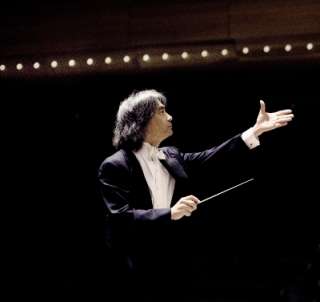|
Back
Into Darkness New York
Stern Auditorium, Carnegie Hall
10/18/2017 - & October 17, 2017 (Montreal)
Samy Moussa: A Globe Itself Infolding
Béla Bartók: Concerto for Orchestra, Sz. 116
Johannes Brahms: Concerto for Violin and Orchestra in D major, Op. 77
Maxim Vengerov (violin), Jean-Willy Kunz (organ)
Orchestre symphonique de Montréal, Kent Nagano (music director and conductor)

K. Nagano (© Felix Broede)
“To most people outside Hungary, Béla Bartók is a lonely genius emerging from the gray background of an underdeveloped country whose capital, compared to the cultural centers of Western Europe, is at best second-rate.”
Judit Frigyesi: Béla Bartók and Turn-of-the-Century Budapest
Béla Bartók has a bittersweet history with New York City. When he lived here he was poor, scrambling to compose while teaching at his little studio. He was also weak and eventually ill, having to choose which compositions to concentrate on during his bouts of questionable health and little energy. Occasionally he received a strong commission as he did when the Boston Symphony asked for a new work that became his Concerto for Orchestra. This futuristic essay was the cornerstone of the concert given by the Orchestre Symphonique de Montréal at Carnegie Hall last evening.
But first A Globe Itself Infolding for organ and orchestra, an unusual choice since Carnegie Hall does not have an installed organ. This OOMP (obligatory opening modern piece) was mercifully short (11 minutes) and reminded of the sort of music that might accompany a television documentary about sharks or whales. Mr. Kunz performed behind a barrier so that only his upper body was visible, but on the stage both left and right were two huge piles of speakers looking like a symmetrical coupling of ancient rock formations. This concert was not a Carnegie Hall event but rather an event utilizing Carnegie Hall and one got the distinct feeling that the auditorium was not filled with music lovers but rather an expat Quebecois community at the conclusion of a fundraiser. There was quite a bit of talking and picture-taking going on throughout the proceedings and I, not knowing the secret handshake, moved to the back row to distance myself from the goings-on.
For many in the years after his death Bartók was the embodiment of modernism. In the early days of television, Ernie Kovacs, himself of Hungarian lineage, used music from the Concerto for Orchestra as background for surrealistic tableaux now celebrated as extraordinarily creative. Bartók had also performed with Benny Goodman at Carnegie Hall and spent much of his artistic capital in trying to promote the pianistic career of his wife Ditta Pásztory. Compared to today’s crop of contemporary composers, he was very well known. One could quarrel with the sound of the orchestra during the Concerto for Orchestra (it was always a bit dark), but not its accuracy or expressiveness. American maestro Kent Nagano conducted a very fine performance, particularly sensitive to the war-torn environment of its composition. The concert was held on what would have been the 100th birthday of my father and the music, particularly the elegy in the middle of the “game of pairs” movement, brought to my mind the sacrifice and anguish of his generation during World War II. Perhaps I felt alone in this auditorium that evening but I also felt that my emotions were sensitively expressed by the people on that stage.
An odd line-up of repertoire placed the Brahms after intermission. Veteran Maxim Vengerov exhibited both sides of the coin of experience, playing alternately masterfully and sloppily. There were far too many mistakes and fat-fingerings for this performance to be considered excellent and this was, of course, most disappointing. Vengerov did put forth his own choice of cadenza, which was interesting, but in this battle of one little fiddle against an entire ensemble it was Brahms who was the loser.
Fred Kirshnit
|